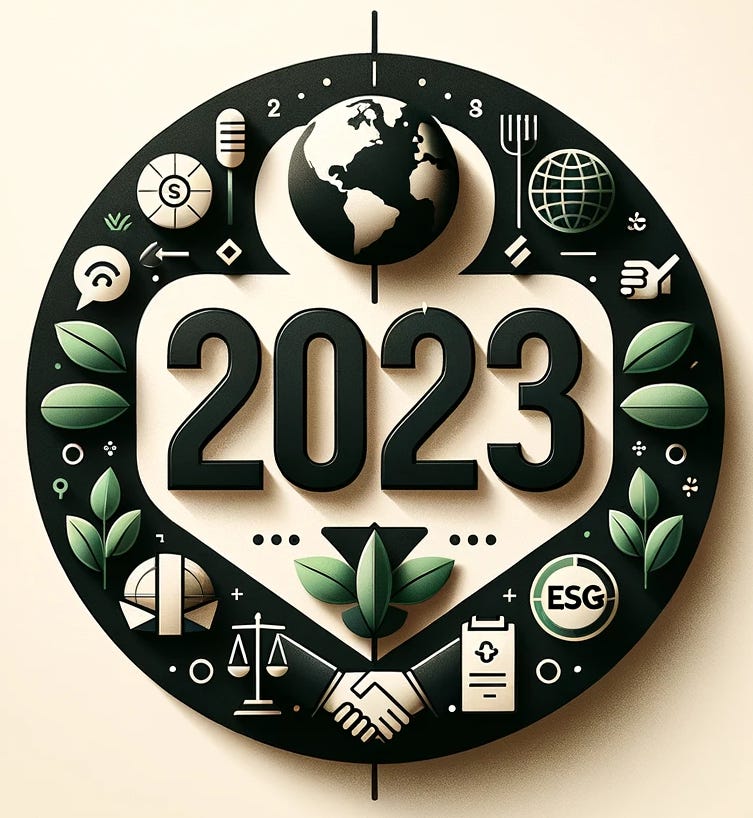ESG in Review: A Look Back at 2023
Reflecting on Progress: Navigating the ESG Landscape of 2023
As we approach the end of 2023, it's an opportune time to reflect on a year that has been pivotal for Environmental, Social, and Governance (ESG) developments. From regulatory changes to corporate commitments, this year has been a testament to the growing importance of sustainability in the global business landscape. Let's dive into some of the key ESG highlights that shaped 2023.
Regulatory Developments: A Global Push for Transparency
One of the most notable trends this year was the increased regulatory focus on ESG. The European Union's expansion of the EU Taxonomy and the SEC’s proposed rules for climate risk disclosure in the United States set new standards for corporate sustainability reporting. These regulations aim to ensure companies are accountable for their environmental impact and provide clear, comparable data for investors.
The Surge in Sustainable Investing
2023 also marked a watershed moment for sustainable investing. Investment giants like BlackRock launched new ESG funds, attracting substantial capital. The inclusion of companies like Tesla in various ESG indices underscored the growing investor appetite for sustainable and responsible business practices.
Corporate Commitments: Leading by Example
Corporates didn't lag in their ESG commitments either. Google’s pledge to operate on carbon-free energy by 2030, and Unilever's target for a deforestation-free supply chain, are prime examples of how companies are taking ambitious steps to reduce their environmental footprint.
Advancements in ESG Reporting Standards
This year also witnessed a significant step towards harmonizing ESG reporting. The establishment of a new board by the IFRS Foundation aimed at creating global sustainability disclosure standards is a crucial development, offering a unified framework for companies to report their ESG performance.
The Rise of Social and Governance Factors
Beyond environmental concerns, 2023 saw a heightened focus on social and governance issues. Nike’s efforts in promoting diversity and the fallout from Wells Fargo's governance scandal highlighted the importance of these aspects in a company's overall ESG evaluation.
Technology: A Catalyst for ESG Goals
Technological innovations played a key role in advancing ESG goals this year. IBM’s AI-driven energy management systems and the use of blockchain for supply chain transparency are just a few examples of how technology is being leveraged to achieve sustainability objectives.
Addressing the Challenges: Greenwashing and Effectiveness
Despite the progress, 2023 wasn’t without its challenges. The controversy surrounding ExxonMobil's greenwashing practices and debates over the actual impact of ESG investments remind us that there's still a long way to go in ensuring transparency and effectiveness in ESG practices.
Key ISSB 2023 Updates:
Release of IFRS S1 and IFRS S2 Standards: The ISSB issued these inaugural standards on June 26, 2023. IFRS S1 focuses on general requirements for sustainability-related financial disclosures, while IFRS S2 is dedicated to climate-related disclosures. These standards were developed in response to a global demand for a consistent approach to sustainability reporting.
Scope of GHG Emissions Reporting: Under IFRS S2, companies are required to disclose their Scope 1, Scope 2, and Scope 3 greenhouse gas (GHG) emissions. However, ISSB has provided temporary relief measures to ease the reporting burden, particularly for Scope 3 emissions, in the initial period of application.
Transition and Implementation Support: Recognizing the challenges of adopting these new standards, the ISSB is focusing on supporting companies and jurisdictions. This includes the establishment of a Transition Implementation Group and the development of capacity-building initiatives to aid in effective implementation.
Effective Date and Applicability: The standards are set to be applied for reporting periods beginning on or after January 1, 2024, although earlier application is permitted. Companies are encouraged, but not mandated, to adopt these standards. The ISSB is working with various jurisdictions and authorities to encourage their endorsement and adoption.
Global Adoption and Integration: The ISSB's standards have been well-received globally, with several jurisdictions indicating plans to adopt them. The standards are designed to be interoperable with other major jurisdictional requirements, such as the European Sustainability Reporting Standards (ESRS) and the Global Reporting Initiative Standards, to minimize redundant or conflicting reporting.
Assurance and Proportionality: While external assurance of reported information is not mandated by the ISSB, it is designed to support verification and assurance by independent parties. The standards also consider the varying resources of companies worldwide, aiming to be proportionate and feasible for companies with limited resources.
Future Developments and Consultations: The ISSB continues to engage in consultations and discussions on future standard-setting priorities, with a focus on expanding and refining sustainability-related reporting standards.
Jurisdictional Adoption and Partnerships: Progress has been made towards the jurisdictional adoption of the standards, and the ISSB has been working closely with various partners and stakeholders to facilitate this process.
Looking Ahead
As we wrap up 2023, the ESG landscape is more dynamic and integral to business and investment strategies than ever before. The developments of this year lay a foundation for continued progress and innovation in the sustainability sphere. The journey towards a more sustainable future is ongoing, and the steps taken in 2023 have undoubtedly moved the needle in the right direction.
Here's to a greener, more sustainable 2024!


